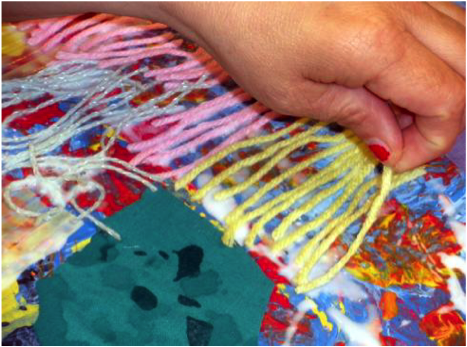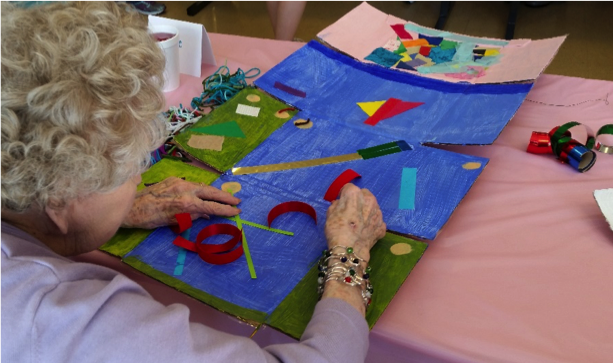
Dr. Sudha Shreeniwas, Associate Professor in the Department of Human Development and Family Studies, examines how familial and societal contexts influence health and well being over the life course. She uses an interdisciplinary approach based on community engaged participatory action research methodology. ARTmail for Alzheimer’s is a partnership project between The Creative Aging Network (CANNC) and the Department of Human Development and Family Studies (HDFS).
The ARTmail project, implemented and evaluated by Lia Miller, (lia@can-nc.org) and Dr. Sudha Shreeniwas (s_shreen@uncg.edu), is supported by the National Endowment for the Arts Research : Art Works Grant.
How the Project Works
ARTmail is an 8-week-long art exchange program designed and delivered by the Creative Aging Network NC. It includes two exchanges of artwork, created by people from two different Memory Care centers. Each participant is paired with a partner from the other center.
Participants use the inside surface of a cardboard box as a canvas, and mail their “in-progress” artwork to their partner, along with comments about themselves. Each participant builds upon the artwork that their partner sends to them.
At the end of the 8-week program, participants, friends, and family attend a public exhibition of the artwork.

Participants are Encouraged to Express Creativity
Participants :
- No prior art experience or expertise are necessary.
- Diverse functioning and abilities are welcome.
The emphasis is on fun, exchange , and connecting with others.
The program is run by trained artists and facilitated by volunteers.
UNCG Researchers Evaluate the Effects and Wellbeing of Participants

UNCG researchers evaluate how ARTmail effects the wellbeing of seniors with memory symptoms, by asking questions about their neuropsychiatric symptoms before and after participating in the art program..
Undergraduate and graduate students are fully involved in the project at all stages, gaining hands-on experience in gerontology research and community programming for seniors.
The study also looks at ways to improve program design and delivery.
What Researchers Expect to Find
It is hypothesized that participants will experience :
- An "Art High" and
- A decrease in depressive symptoms. apathy, and agitation.
The overall research goal is to improve the quality of life of seniors with varied cognitive abilities, and build the capacity of community arts organizations to better serve them.